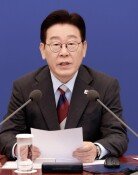Samsung expected to record ‘earnings shock’ in Q1 2019
Samsung expected to record ‘earnings shock’ in Q1 2019
Posted March. 27, 2019 07:36,
Updated March. 27, 2019 07:36
Samsung Electronics announced Tuesday that it is expecting lower-than-expected earnings for the first quarter of the year due to unfavorable display and memory chip market conditions. This is the first time in 50 years since its foundation that the tech giant pre-announced an earnings shock even before the end of the quarter. Tuesday’s announcement has made it official that Samsung Electronics is suffering an earnings shock for two straight quarters.
It has become highly likely that Samsung’s operating profit will drop to the six trillion won mark. in the first quarter of the year. This is more than a 30 percent drop since the fourth quarter of last year, when its operating profit barely reached the 10 trillion won mark, and less than half of the corresponding period of last year. Expectations that the chip market conditions will improve in the second half are turning pessimistic that they might get better after a year from now.
An earnings shock by Samsung Electronics is likely lead to weakening of other economic indicators as the company’s operating profit accounts for 38 percent of all operating profits of publicly listed companies and its corporate tax takes up more than six percent of the total corporate tax paid. Worsening conditions in the memory chip market can deal a blow to the already flagging domestic market as memory chip takes up 21 percent of all exports of Korea. Korea’s export has been on the decline since December of last year with the weak sales of memory chips. Every 10 percent decline in memory chip export accompanies 50,000 direct and indirect losses in employment and loss of up to 20 trillion won in production inducement, according to the Korea Economic Research Institute. It is worrisome that major pillars of our exports, including display, oil and chemical industries, are struggling along with our traditional key industries, such as car and shipbuilding.
Korea failed to nurture new growth engines and exporting products that are as competitive as memory chips. It is high time that we develop new growth engines and lower reliance on memory chips. To this end, the government should aggressively drive innovative growth through deregulation. It should not neglect a poor business environment, where the construction of transmission towers for a semiconductor plant has been delayed for over four years and the company eventually shouldered the construction cost. For their part, businesses should make investments in new areas, such as artificial intelligence, autonomous vehicles, drones, and 5G service. We cannot afford to waste more time on exhausting arguments on policies.





![아침 공복 따뜻한 물 한 잔, 정말 살 빠지고 해독될까?[건강팩트체크]](https://dimg.donga.com/c/138/175/90/1/wps/NEWS/IMAGE/2026/03/05/133467930.3.jpg)

